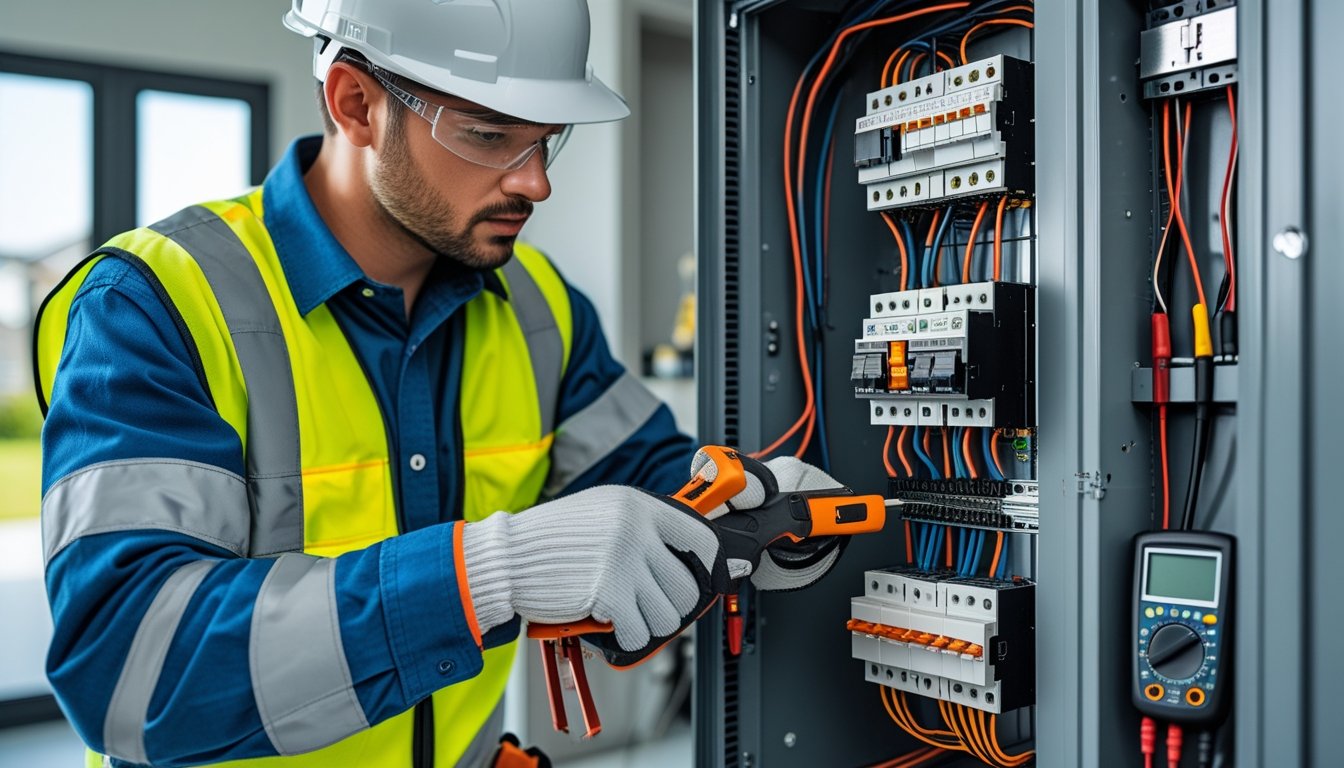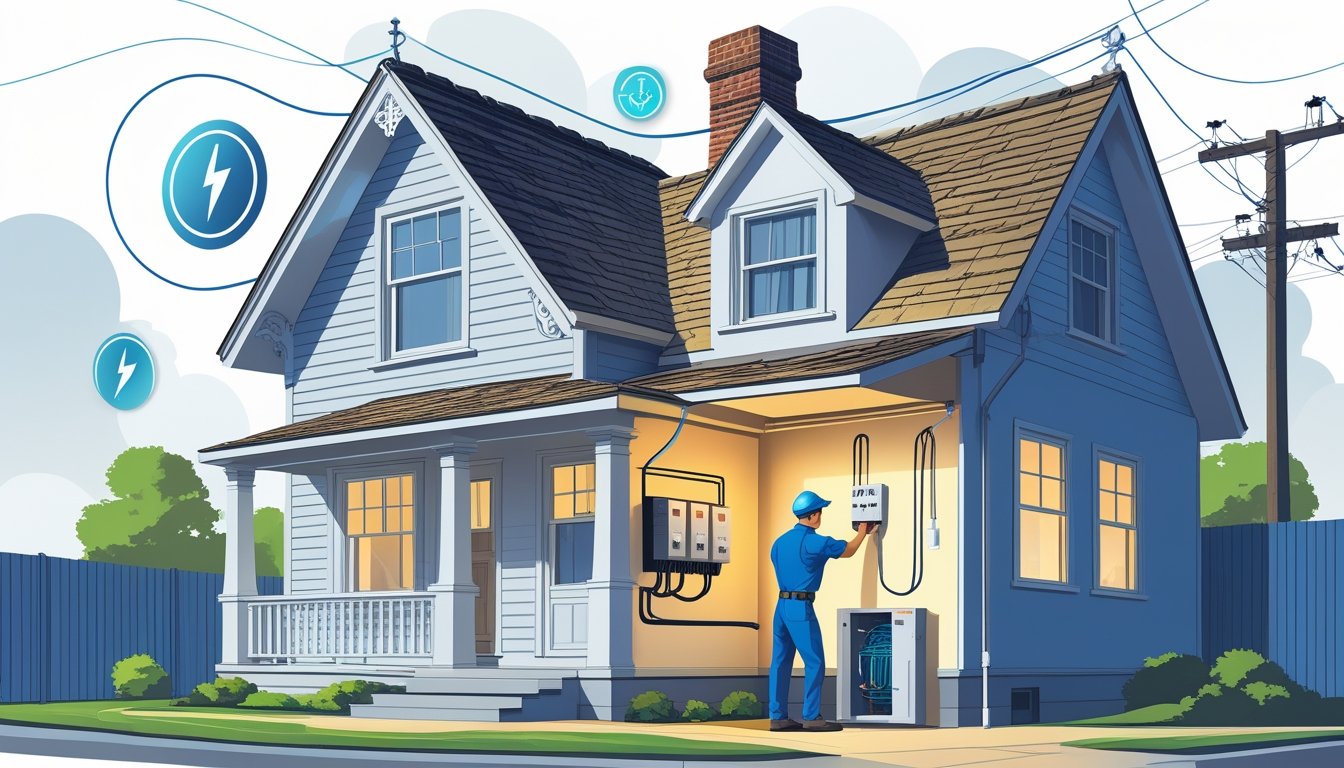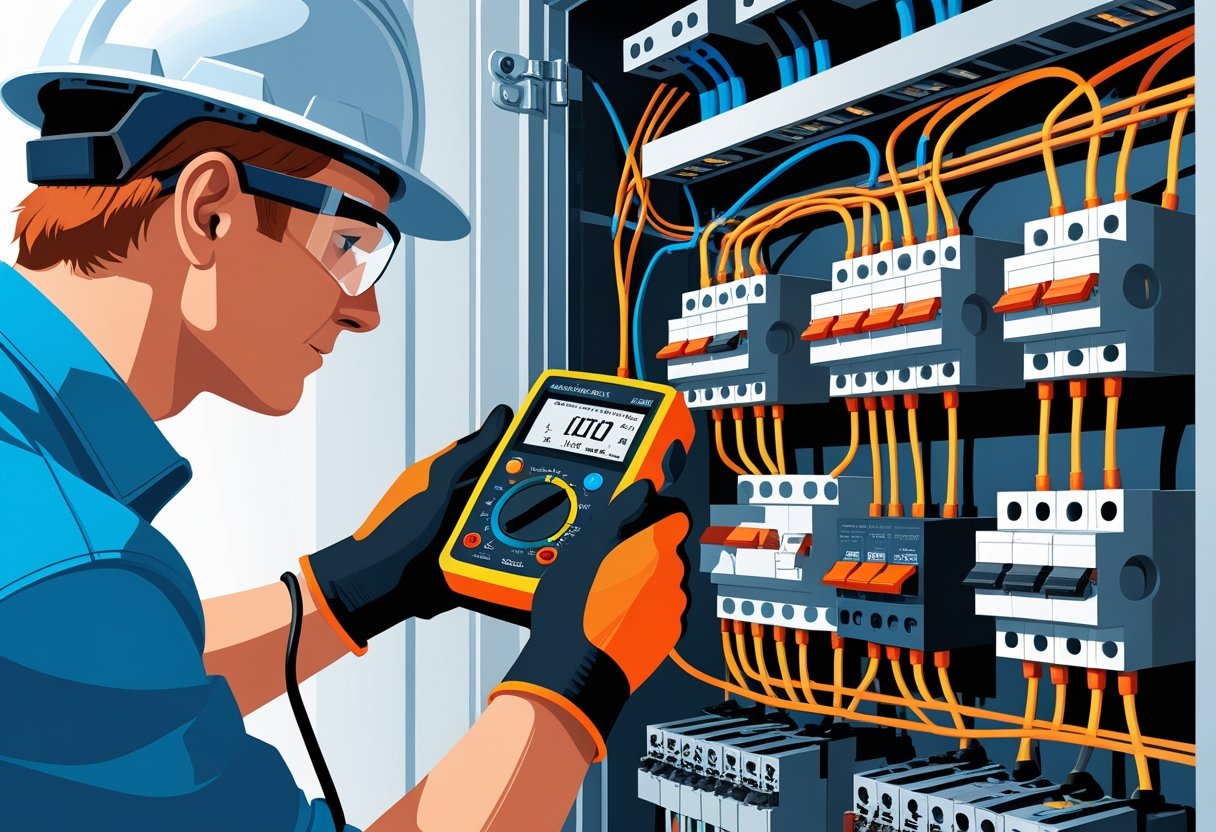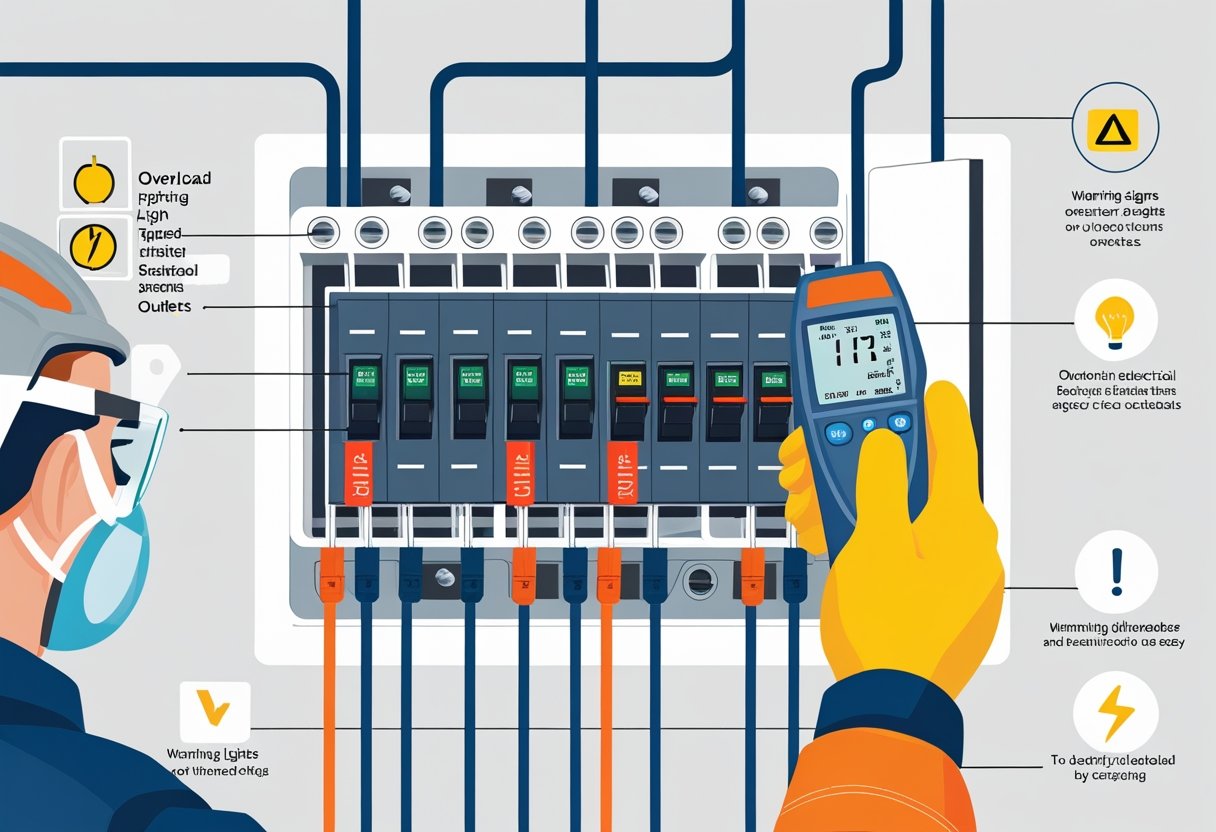If you don’t upgrade your electrical panel, you could face frequent power outages and tripped breakers when too many devices draw power at once. This is your home’s way of warning you that the panel can’t handle the demand.
Ignoring these signs can lead to electrical fires, damage to your appliances, and even void your home insurance.
Your old panel might not just struggle with power—it could also fail important safety inspections. As you add more electronics and appliances, your panel needs to keep up to avoid overloads and unsafe wiring problems.
Knowing when to upgrade isn’t always easy. Watch for flickering lights or breakers that trip too often.
Taking care of your panel early means fewer surprises and a safer, more reliable electrical system.
Understanding the Role of an Electrical Panel
Your electrical panel is the main hub that controls power in your home. It safely distributes electricity from the utility company to different circuits.
Knowing what it does and the types available helps you understand why upgrades matter.
What an Electrical Panel Does
An electrical panel directs electricity to every part of your home. When power comes from the street, the panel splits it into different wires for rooms or appliances.
Inside the panel are circuit breakers. These breakers stop electricity flow if there’s too much power or a problem, preventing fires and damage.
If your panel is old or too small, it might trip breakers often or fail to send stable electricity. This can cause flickering lights or issues with appliances.
Common Types of Electrical Panels
The two main types of electrical panels are fuse panels and breaker panels.
Fuse panels use fuses that melt and break the circuit when overloaded. They are older and less common now.
Breaker panels use switches (breakers) that flip off to stop power when needed. These are safer and easier to reset.
Most homes now have breaker panels in sizes like 100, 150, or 200 amps. The size tells you how much power your home can safely use.
If you add more devices, your panel size needs to match that demand to avoid problems.
Key Reasons to Upgrade Your Electrical Panel
Upgrading your electrical panel helps your home handle more power safely. It also supports modern appliances better and reduces risks like electrical fires and frequent breaker trips.
Increased Power Demands
Your home uses more electricity today than it did when the panel was first installed. If you’ve added air conditioners, computers, or electric cars, your panel might struggle to keep up.
When your panel can’t handle the load, circuit breakers trip often. This can interrupt your daily life and damage appliances.
Upgrading gives you a panel with higher capacity. It can carry more power without overloading.
This keeps electricity flowing smoothly and prevents unexpected outages.
Modern Appliance Requirements
New appliances often need more power than older models. Smart home systems, big kitchen gadgets, and advanced heating units all require steady, strong electricity.
An old electrical panel may not provide the consistent power needed for these devices. This can cause flickering lights or slow appliance performance.
By upgrading, you ensure your panel is compatible with today’s appliances. This protects your investment in new technology and improves how everything works in your home.
Outdated Panel Safety Risks
Older panels can be a safety hazard. They may overheat, wear down, or have faulty wiring, increasing the risk of electrical fires.
Insurance companies and home inspectors might also see an outdated panel as a problem. If you don’t upgrade, your insurance could be voided, leaving you without coverage for electrical damage.
Upgrading improves safety by meeting current building codes. A new panel keeps your home safer and helps prevent costly repairs from electrical issues.
Dangers of Not Upgrading Your Electrical Panel
If you keep using an old electrical panel, it can cause serious problems. You might face risks like fire or damage to your home’s wiring.
Your electrical system may also struggle to handle the power needs of modern appliances.
Potential Electrical Fires
An outdated electrical panel can overheat, especially if it can't handle your home's power needs. This overheating may cause sparks, which can lead to an electrical fire.
Old panels might have worn-out parts or loose connections that increase this risk. Your insurance company might also deny claims if your panel is outdated and causes fire damage.
Regular safety inspections could flag an old panel as unsafe. Upgrading reduces the chance of fire and keeps your home and family safer.
Overloaded Circuits
If your electrical panel is old, it may not support today's number of devices. When too many appliances run at once, circuits can get overloaded.
This often causes breakers to trip or power to flicker in your home. Overloading also stresses your wiring, which can wear it down over time.
This might lead to appliance damage or electrical failure. Upgrading your panel helps distribute electricity properly and prevents these problems.
Home Safety and Electrical Code Compliance
Not upgrading your electrical panel can lead to serious issues with safety and meeting local code rules. This can affect your ability to pass inspections and keep insurance coverage.
Both are important for protecting your home and peace of mind.
Failing Home Inspections
If your electrical panel is old or overloaded, it can fail a home inspection. Inspectors check for proper wiring, panel capacity, and safety features like circuit breakers.
An outdated panel may not meet current safety standards. Failing an inspection can delay home sales or renovations.
It may require expensive repairs or a full panel upgrade to pass. You want your panel to be able to handle all your electrical needs without risk.
Keeping your panel up to code means fewer safety hazards like electrical fires or shocks. It also ensures your home stays safe for you and your family.
Insurance Coverage Issues
Not upgrading your electrical panel might cause your insurance company to deny claims after an electrical fire or damage. Insurance policies often require your electrical system to meet safety standards.
If your panel is faulty or overloaded, your claim could be rejected. This could leave you responsible for costly repairs or replacements.
Many insurance providers also require proof of electrical inspections and upgrades to maintain coverage. Keeping your panel updated helps you avoid problems with insurance and keeps your home financially protected.
Impacts on Your Home and Lifestyle
When your electrical panel is outdated, you might face problems that affect your daily life. These issues can interrupt your power supply and harm your devices.
Knowing what to expect can help you make better choices about upgrading.
Frequent Power Outages
If your breaker trips often, your panel can't handle the electrical load. This causes sudden power cuts in parts of your home or even throughout the entire house.
Each time the power goes out, you lose work, comfort, and sometimes food in the fridge. Frequent outages also increase wear and tear on your electrical system.
Older panels can become unsafe as they struggle to keep up with modern appliances. This might increase the risk of electrical fires or costly damage.
Damage to Electronics and Appliances
When your electrical panel is overloaded, your devices can receive unstable power. This causes voltage fluctuations, which can make lights flicker and appliances run poorly.
Over time, these changes can damage sensitive electronics like computers and TVs. Appliances may also wear out faster because they don’t get a steady power supply.
For example, refrigerators, washers, and ovens might break down sooner, leading to expensive repairs or replacements.
A new panel provides a steady and strong power flow. This protects your electronics and appliances from sudden surges or drops in voltage, helping them last longer and work better.
Costs and Long-Term Consequences
Ignoring an old or overloaded electrical panel can lead to higher repair bills and hurt your home's value. These problems build up over time and can become costly.
Rising Electrical Repair Bills
When your panel is outdated, it can't handle modern power needs. This may cause frequent circuit breaker trips and damage to appliances.
Each time you reset breakers or fix electrical faults, repair costs add up. Over time, these small fixes can lead to bigger, expensive problems.
If your panel is overloaded, it raises the risk of electrical fires. Repairing fire damage is much more costly than upgrading your panel.
You may also pay more if your insurance refuses to cover damages caused by an old electrical system. Fixing problems early saves you money later.
Decreased Property Value
Homes with old electrical panels may fail safety inspections. This can scare potential buyers or lenders away.
Buyers often look for modern, safe electrical systems before making decisions. An outdated panel may lower your home’s market price.
Upgrading your panel can be a selling point. It shows you’ve kept the home updated and safe.
If you don’t upgrade, you might spend more time on the market or have to reduce your asking price to sell.
Identifying Signs You Need an Electrical Panel Upgrade
You might notice clear changes in how your electrical system works. These changes can show up as visible damage or problems with how your power behaves.
Watching for these warning signs can help you decide when to upgrade your panel.
Visible Wear and Aging
Look carefully at your electrical panel. If you see rust, corrosion, or burn marks, these are signs the panel is breaking down.
An old panel may have outdated parts that don’t meet modern safety standards. This increases the risk of electrical fires.
You might also notice your panel feels warm or hot to the touch. This means it’s under too much strain.
Worn-out parts inside can cause loose connections. If your panel is more than 20-30 years old, it’s a good idea to have an electrician check it.
Tripped Breakers and Dimming Lights
Frequent tripping of circuit breakers is a common sign you need an upgrade. When breakers trip often, it means the panel can’t handle the electrical load in your home.
This can happen when you add new devices or appliances. Dimming or flickering lights when you use appliances also show power fluctuations.
This happens because the panel can’t supply steady voltage to all your devices. Upgrading to a higher-capacity panel can fix these problems and keep your power stable.
Conclusion
If you don’t upgrade your electrical panel, you may face regular power problems like flickering lights and frequent breaker trips.
These issues can be frustrating and could mean your panel is overloaded or outdated. Overloaded or old panels increase the chances of electrical fires and damage to your appliances.
This also means you might fail safety inspections or have trouble with your insurance. Upgrading your panel helps make sure you have enough power for all your devices.
It stabilizes voltage and keeps your power supply steady. This is especially important if you add new appliances or technology to your home.
Here’s what to watch for:
- Frequent circuit breaker trips
- Flickering or dimming lights
- Appliances that don’t work properly
- Signs of burning or buzzing near the panel
Taking action means you can avoid costly repairs later. It also helps keep your home and family safe.
If you’re not sure, have a licensed electrician inspect your system. They can recommend the right upgrade for your needs.
Frequently Asked Questions
Upgrading your electrical panel involves several important steps and costs. You should know about permits, expenses, timing, and the impact on your home’s value.
There are also questions about how often to replace the panel and possible incentives.
Can I upgrade my electrical panel without a permit?
No, you typically need a permit to upgrade your electrical panel. This ensures the work follows safety codes and local rules.
Doing upgrades without a permit can lead to fines or problems when selling your home.
What is the typical cost to upgrade an electrical panel to 200 amps?
Upgrading to a 200-amp panel usually costs between $1,500 and $3,000. The price depends on factors like labor, permits, and whether you need to update other parts of your electrical system.
How often should I replace my home's electrical panel?
Electrical panels often last 25 to 40 years. Replace yours if it is older, causes frequent breaker trips, or cannot support your current power needs.
What is the time frame for completing an electrical panel upgrade?
A panel upgrade usually takes 1 to 2 days. The time may vary based on your electrical system’s complexity and any required inspection appointments.
Will upgrading my electrical panel add value to my home?
An upgraded electrical panel can increase your home’s value. It improves safety and supports modern appliances, which may appeal to buyers.
Are there any incentives or credits available for upgrading my electrical panel?
Some local or state programs offer incentives or rebates for electrical upgrades.
Check with your utility company or local government to see if you qualify for any credits.





